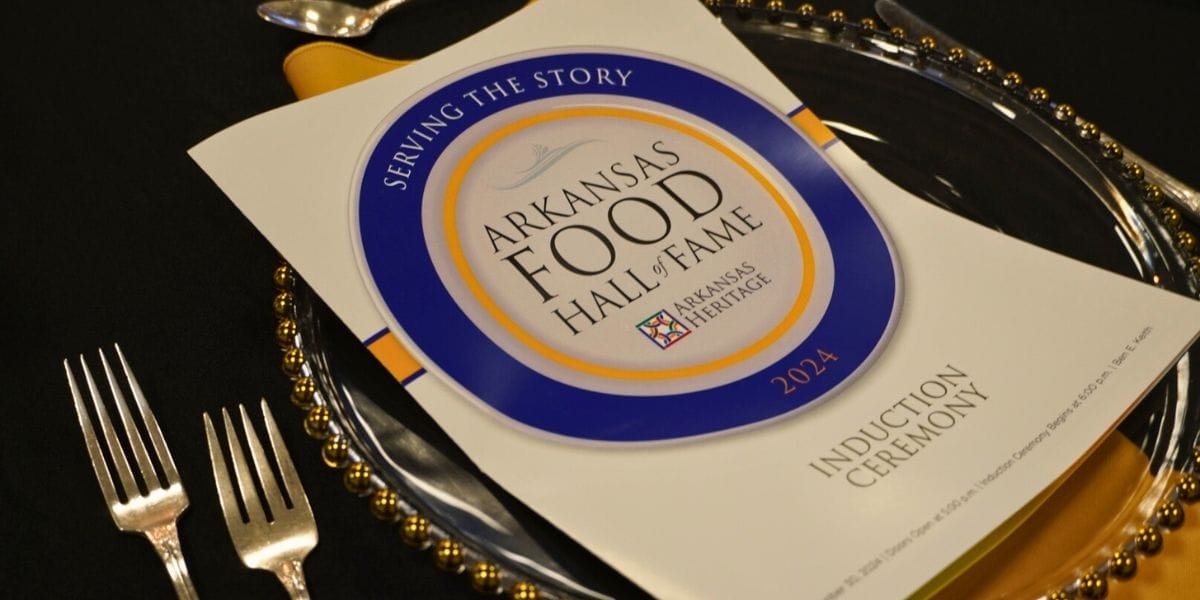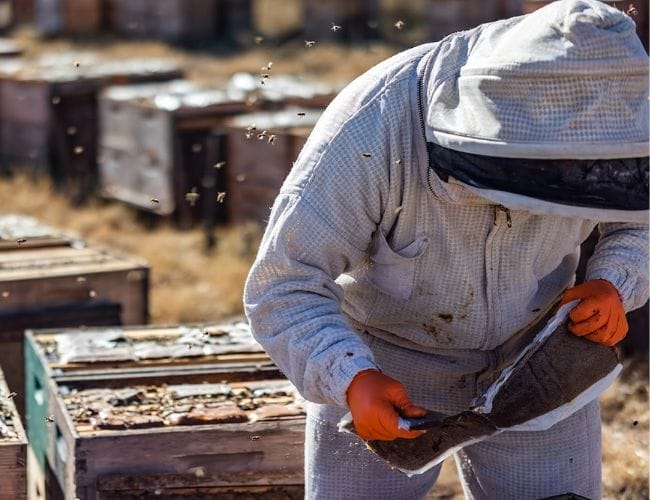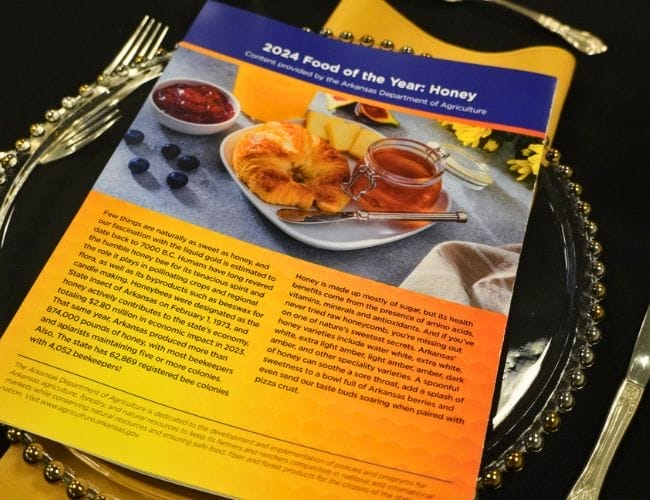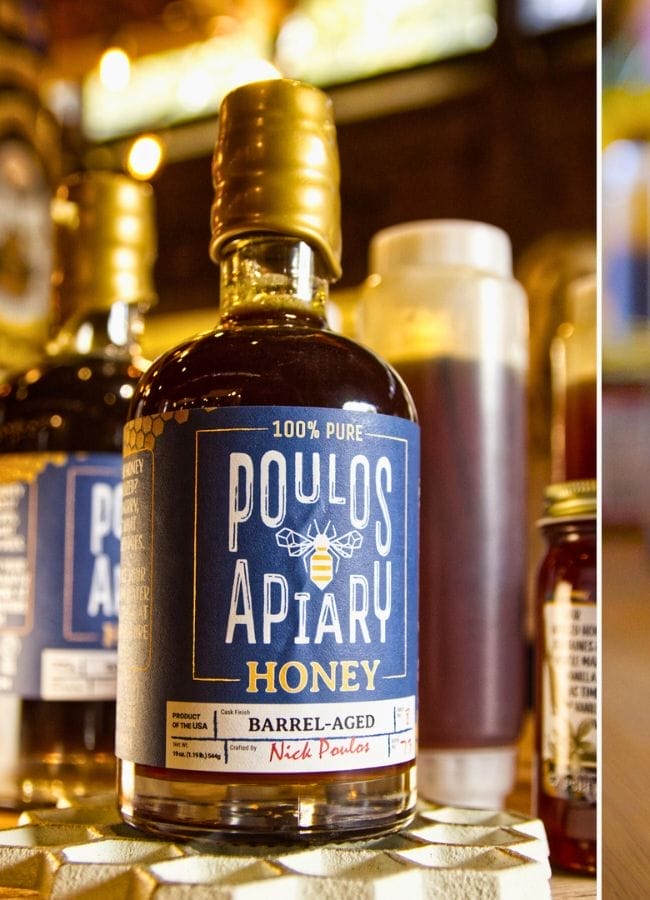

Uh oh...
It appears that you're using a severely outdated version of Safari on Windows. Many features won't work correctly, and functionality can't be guaranteed. Please try viewing this website in Edge, Mozilla, Chrome, or another modern browser. Sorry for any inconvenience this may have caused!
Read More about this safari issue.

Honey has been a beloved staple in Arkansas kitchens and traditions for generations, so it’s no surprise that it was named the 2024 Arkansas Food Hall of Fame Food of the Year. This golden nectar, produced by the hardworking honeybee, is part of the Natural State’s agricultural and culinary heritage.

The Heritage of Honey in Arkansas
The honey story in Arkansas is deeply rooted in tradition and natural abundance. The Western Honeybee (Apis mellifera) has played a critical role in the state’s agricultural history, contributing to both crop pollination and the production of one of nature’s sweetest treasures. Recognizing the importance of honeybees, Arkansas declared the honeybee as the state insect in 1973, solidifying its place in its identity and emphasizing the vital connection between bees and Arkansas’s ecosystem.
Beekeeping has a long history in Arkansas, with families and communities passing down the craft through generations. For early settlers, beekeeping was both a practical necessity and a beloved pastime. Honey provided a natural sweetener before the widespread availability of processed sugar and beeswax was used for candles, soaps, and food preservation. Today, this heritage continues as beekeepers maintain the art and science of honey production while serving as stewards of the environment.
80% of fruit and vegetable varieties need bees to ensure a good harvest. Every third spoonful of food we eat is dependent on pollination.” – Department of Agriculture
The connection between honeybees and the state’s agricultural success is undeniable. Arkansas’s diverse landscapes, from the fertile Delta region to the rolling hills of the Ozarks, provide an ideal environment for various flowering plants, giving Arkansas honey its distinct flavors and qualities.
From a historical perspective to a modern-day celebration, honey symbolizes Arkansas’s natural bounty, resilience and dedication to sustainability. Honey remains a cherished part of Arkansas culture and a celebrated ingredient in homes and restaurants across the state.
Why Honey Won the Food of the Year Award
While the official announcement was made in May, the Arkansas Food Hall of Fame ceremony recently recognized honey as the state’s food of the year!
Honey was chosen for its timeless appeal, cultural significance, and versatility in traditional and modern cooking. It embodies Arkansas’s commitment to natural, high-quality ingredients and sustainable farming practices. Its use in sweet and savory recipes and its connection to local producers made it a deserving honoree. Honey’s consumable components, reusable hive boxes, and role in feeding and cultivation for agriculture also significantly contribute to its demonstrated sustainability.

The Bee Industry in Arkansas
The bee industry in Arkansas is a thriving sector that significantly contributes to the state’s agricultural success and economy. According to the Arkansas Department of Agriculture, honey production in the state generated an impressive 874,000 pounds of honey in 2023, reflecting the dedication of Arkansas beekeepers and the abundance of pollinator-friendly environments across the state. This production translated into a direct economic contribution of over $1.5 million, with a total economic impact of $2.8 million, showcasing the far-reaching benefits of honeybees beyond just honey production.
At the heart of this industry are the 62,869 registered colonies of honeybees managed by Arkansas’s 4,052 beekeepers. These colonies are located across the state, from the rural Delta to the forested Ozarks, with each region offering unique floral resources that give Arkansas honey its distinctive flavors.
Honeybees are essential not only for producing honey but also for their critical role as pollinators. Their activity supports the production of fruits, vegetables, nuts, and other crops, ensuring agricultural sustainability. The synergy between beekeeping and farming bolsters the state’s food supply while fostering biodiversity. Arkansas’s beekeepers’ dedication and the growing interest in beekeeping as a sustainable practice are helping to solidify honey’s role as a vital part of the state’s agricultural identity and economic health.
This flourishing bee industry is a testament to Arkansas’s commitment to preserving natural resources while supporting innovative agricultural practices. Whether through honey production, pollination services or ecological stewardship, Arkansas’s bees and beekeepers are key players in the state’s present and future.

Arkansas Beekeepers and Honey Producers
The state has many talented beekeepers and honey producers who bring unique flavors to their products. Here are a few to check out:
- 3C’s Bees | Conway
- Bemis Honey Bee Farm | Little Rock
- Brothers Honey | Conway
- Cedar Hive Honey | Mountain View
- Crooked Creek Bee Co. | Harrison
- Culps Honey Farm | Jonesboro
- Diva Bees Apiary | Benton
- Fischer’s Honey Co. | North Little Rock – the oldest and largest honey producer in Arkansas, dating back to 1935.
- Guenther Apiary Farm | Roland
- Honeyton Farms | Cabot
- Honig Hills Honey | Huntsville
- Lake in the Willows Apiary | Scott
- Poulos Apiary | Springdale
- Richard’s Honey | El Dorado
- Solomons Farm | Emmet
- Sweetgrass Ranch Honey | Arkadelphia
- Tater Hill Honey | Charleston
- Two Trees Farm | Harrison
- White River Creamery | Elkins – known for pairing their cheeses with local honey
- Wildwood Honey Bees | Cabot
These producers offer pure, local honey, often host tours, and sell other bee-related products. Find a local beekeeper and honey producer near you!

Innovations and Unique Uses for Honey
Arkansas honey producers are embracing new technology to improve sustainability and efficiency. Some use smart hives with sensors to monitor hive health and productivity. Meanwhile, honey’s versatility is being explored in products like honey-infused drinks and skincare and even as an ingredient in craft beers and cocktails.
Poulos Apiary even partners with a local bourbon producer to pour honey into used barrels to create its famous bourbon pecans and filtered and infused honey. The barrels are then returned to the bourbon distillery, which makes a unique bourbon labeled “kissed with honey.” These types of creative partnerships extend the agricultural ecosystem in Arkansas. Next time you are at your local dive, ask where they get their honey; you might be surprised by their local source.

The Health Benefits of Honey
Honey isn’t just delicious; it’s packed with health benefits and antioxidants, a wide array of vitamins, minerals and amino acids.
- Natural Sweetener: A healthier alternative to refined sugar.
- Rich in Antioxidants: Helps combat inflammation and supports overall health.
- Soothes Coughs and Sore Throats: A natural remedy for colds and allergies.
- Wound Healing Properties: Raw honey can be a topical treatment for minor cuts and burns.
Recipes Featuring Arkansas Honey

Other recipes you may love just in time for your New Year’s celebrations!
- Honey ham tortilla roll-ups with honey dip
- Crostini with Peaches, Blue Cheese and Honey
- Chorizo Meatballs with Honey Citrus Glaze
- Springtime Honey Bun Cake
- Grilled Honey Glazed Chicken Thighs
- Homemade Granola
- Spiced Honey Cake Pie with Honey Roasted Pears
- Add a little honey (or heat!) to your favorite chicken wings
- Whipped feta with pistachios and a honey drizzle
- Take your favorite pizza dip and drizzle it with a bit of hot honey
Arkansas honey is more than just a sweet treat—it’s a testament to the state’s agricultural ingenuity and commitment to quality. Whether you’re drizzling it over biscuits, crafting a holiday dessert or supporting local beekeepers, honey offers a delicious and meaningful way to celebrate Arkansas’s natural bounty.
Helpful Resources:
We do the work.
You check your email.
Sign up for our weekly e-news.
Get stories sent straight to your inbox!








Like this story? Read more from Keisha Pittman McKinney
Some stories feel too heavy to touch at first glance, stories shaped by...
Winter is the perfect time to settle in with a good book, especially one...
The Dierks High School win in the Friday Night 5G Lights competition has...
Join the Conversation
Leave a Comment